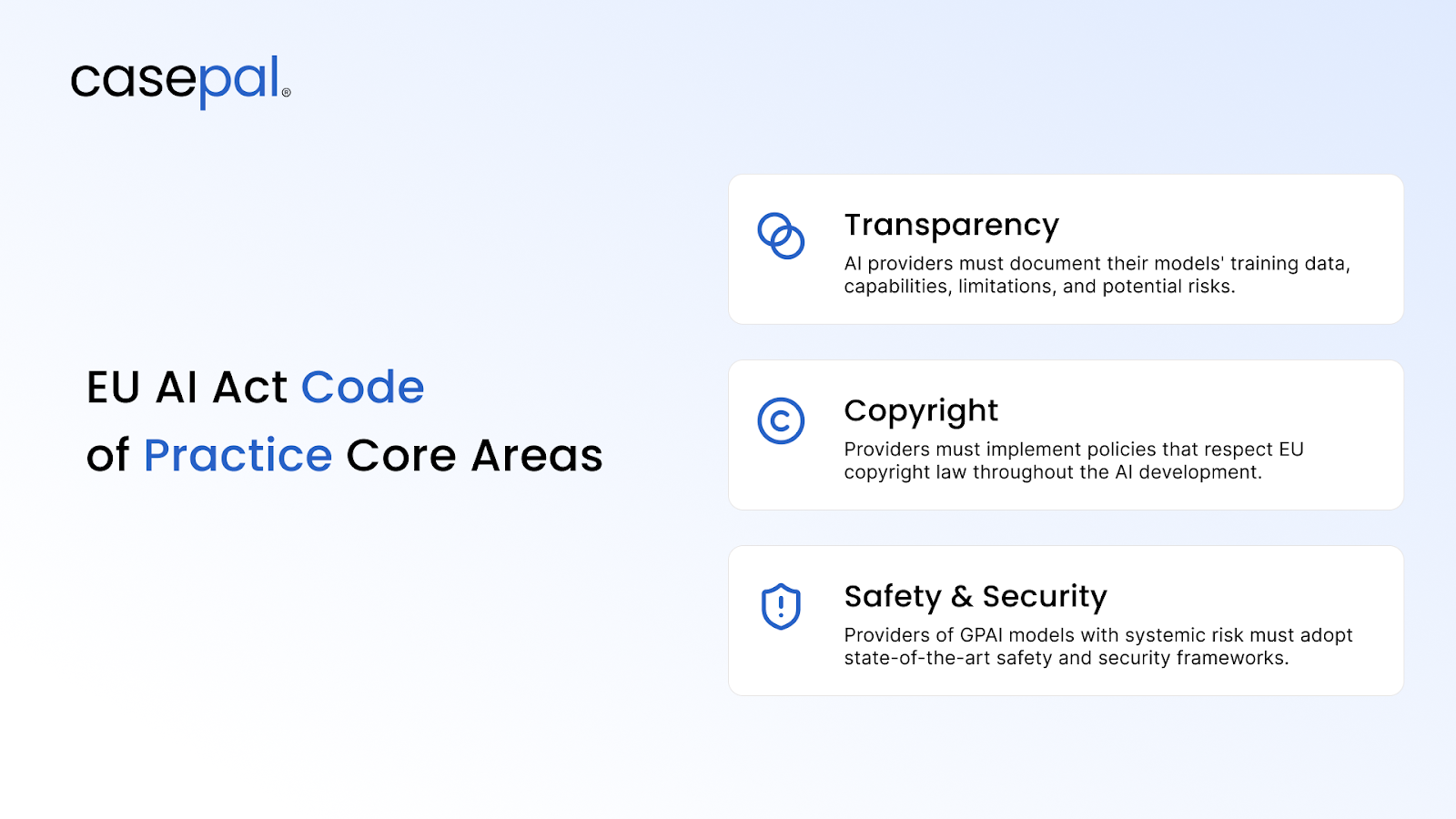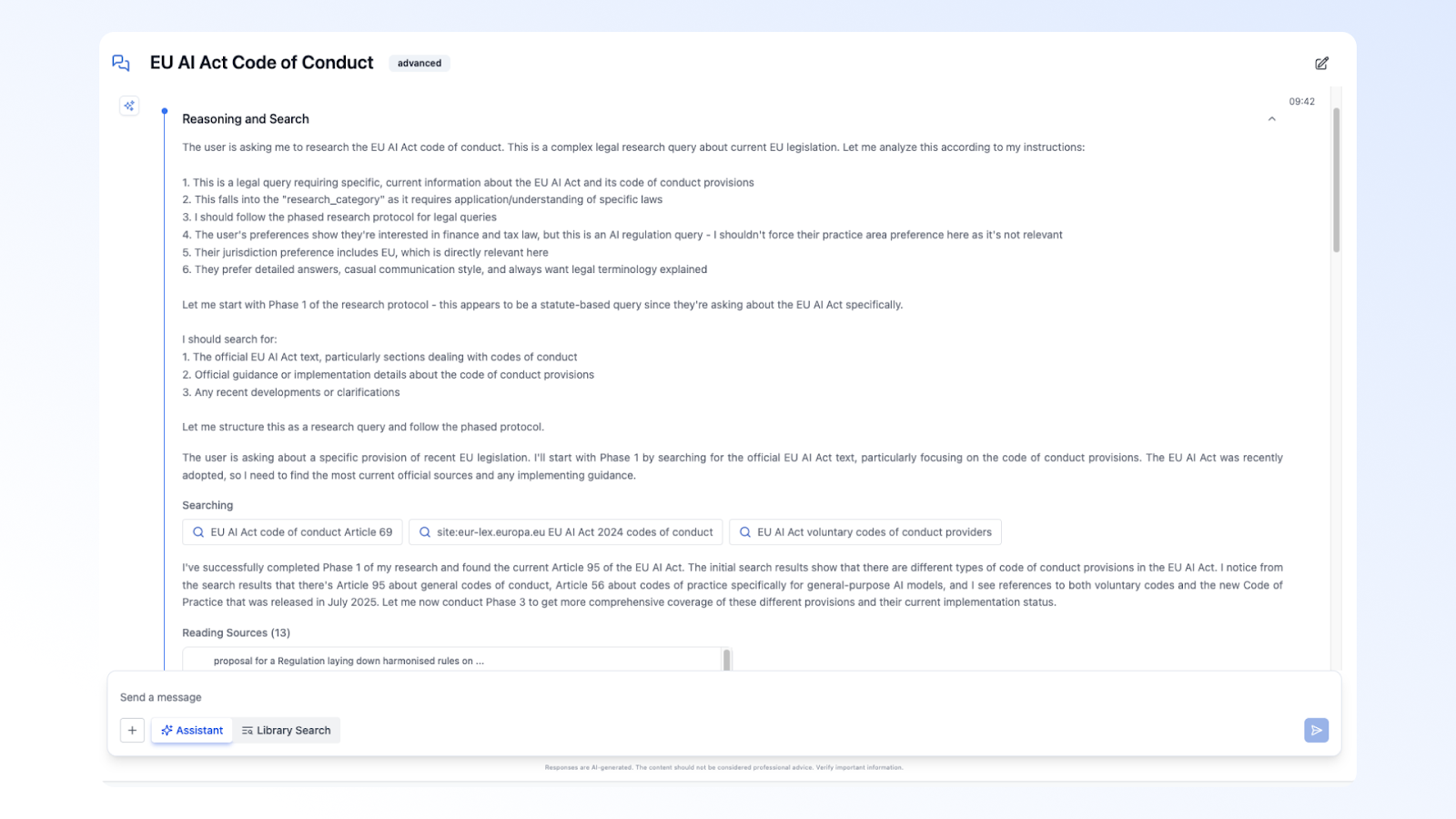Commitment: casepal Works Exclusively with EU AI Act Code of Practice Signatories
At casepal, we believe that legal professionals deserve AI they can trust. That's why we've made a fundamental commitment: we only deploy general-purpose AI models from providers who have signed the EU AI Act Code of Practice.
While the European Union's AI Act is built on three fundamental pillars: transparency, copyright compliance, and safety, these principles aren't new to European law. They've been key part of established EU legislation: transparency obligations under Regulation (EU) 2016/679 (GDPR) and Regulation (EU) 2022/2065 (Digital Services Act), copyright compliance under Directive 2001/29/EC (Copyright Directive) and Directive (EU) 2019/790 (Copyright in the Digital Single Market Directive), and safety requirements across again the GDPR, the New Legislative Framework and sectoral regulations. What the AI Act does is provide a comprehensive framework for how these well-established principles must apply specifically to artificial intelligence systems.
Under Articles 53 and 55 of Regulation (EU) 2024/1689 (the AI Act), providers of general-purpose AI models are subject to mandatory compliance obligations that vary according to the computational capacity and systemic risk profile of their models. Article 53 imposes baseline obligations on all GPAI providers, including the duty to prepare and maintain comprehensive technical documentation, implement policies ensuring compliance with Union copyright law, and publish detailed summaries of training data. Article 55 establishes additional systemic risk obligations for frontier models exceeding 10^25 FLOPs, requiring model evaluation protocols, adversarial testing procedures, incident reporting mechanisms, and cybersecurity safeguards.
The Code of Practice, adopted pursuant to Article 56 of the AI Act and published by the European Commission on 10 July 2025, serves as a harmonized compliance framework that translates these statutory obligations into specific, measurable standards. While adherence to the Code constitutes a rebuttable presumption of compliance with Articles 53 and 55, providers may demonstrate conformity through alternative means, provided such methods achieve equivalent levels of transparency, safety, and copyright protection as mandated by the Regulation.
Understanding the EU AI Act Code of Practice
The EU AI Act Code of Practice is a comprehensive framework developed through a multi-stakeholder process involving independent experts, industry leaders, and policymakers. Published in July 2025, the Code establishes concrete standards across three critical areas:

- Transparency: AI providers must document their models' training data, capabilities, limitations, and potential risks..
- Copyright Compliance: Providers must implement policies that respect EU copyright law throughout the AI development process.
- Safety and Security: Providers of general-purpose AI models with systemic risk must adopt state-of-the-art safety and security frameworks, including systemic risk management processes and measures. This includes robust assessment, monitoring, and mitigation strategies for high-risk AI systems.
What makes the Code particularly significant is its voluntary nature. AI providers choose to sign because they recognize that responsible development isn't just good practice, it's essential for building trust with professional users.
Our commitment at casepal
When we started building casepal, we had conversations with hundreds of legal professionals across Europe and beyond. One theme emerged consistently: lawyers want AI that enhances their work without compromising their professional responsibility.
With ISO 27001:2022 certification, dedicated GDPR and AI Act compliance audits, as well as comprehensive security and data-residency practices. At casepal, enterprise-grade security and continuous compliance with regulatory and industry standards are part of a demonstrated commitment to responsible development and deployment of AI for legal and professional work.
The EU AI Act Code of Practice is positioned to become a key element in our vendor evaluation process. Providing more transparency when assessing which general-purpose AI models and from which providers are acceptable to be deployed to our professional, domain-specific systems. This level of transparency enables us to make even more informed decisions about which models align with the legal professional standards.
What this means for Legal Professionals using casepal
The EU AI Act Code of Practice represents a significant leap forward, not only for general-purpose AI providers, but for domain-specific AI like casepal and, ultimately, for the legal professionals who rely on these technologies.
This regulatory framework enhances our ability to evaluate and deploy LLM-powered technologies and AI models into casepal. While we have always maintained a high standard of evaluation for general-purpose AI providers, assessing development practices, data handling, and safety measures, the Code of Practice elevates this process to a higher level of transparency and accountability.
Our commitment to Code of Practice signatories translates into concrete benefits for our evaluation of models and for our users:
Documented AI Capabilities
Every AI model integrated into casepal will come with comprehensive documentation about its training process, data sources, and known limitations.
Efficient Due Diligence
Rather than conducting dedicated assessments of each potential AI partner's model practices, we would leverage the Code's standardized framework as an additional key resource for our vendor evaluation process.
Strategic Partnership Opportunities
The Code creates a clear demarcation in the AI provider landscape between those committed to responsible development and those who are not. This enables us to identify and prioritize partnerships with providers who share our values and professional standards, leading to deeper, more strategic collaborations.
Regulatory Alignment
By working with Code signatories, we ensure that the models we use align with EU regulatory expectations. This provides additional assurance for firms operating in European jurisdictions or handling cross-border matters.

Leading AI Providers under the Code of Practice
The list of Code signatories reads like a who's who of responsible AI development: OpenAI, Anthropic, Google, Microsoft, Amazon, IBM, and others. What's particularly encouraging is the diversity of signatories. From established tech giants to startups like Mistral AI and Cohere, the Code has attracted providers across the AI ecosystem.
Some providers, like xAI, have signed only the Safety and Security chapter, indicating they'll have to demonstrate compliance with transparency and copyright obligations through alternative means. This flexibility would allow for different approaches while maintaining core safety standards.
Looking Ahead
The EU AI Act Code of Practice represents just the beginning of a broader movement toward responsible AI development. As the legal industry continues to embrace AI technologies, frameworks like the Code will become increasingly important for ensuring that innovation serves professional users without creating new risks.
At casepal, we're committed to staying at the forefront of this movement. We'll continue to work exclusively with AI providers who demonstrate a genuine commitment to transparency, safety, and ethical development.
This isn't always the easiest path. It sometimes means saying no to AI models that offer impressive capabilities but lack the transparency and safety measures that legal work demands. It also means focusing resources on continuous evaluation of our GPAI providers to ensure they demonstrate commitments to the responsible development of general-purpose AI. We believe that the Code of Practice would be an increasingly valuable resource to that end.
Ensuring the positive impact of AI on legal professionals depends not only on its performance but also on the responsible development and deployment of AI.
To learn more about the EU AI Act Code of Practice and view the complete list of signatories, visit the European Commission's AI Office: https://digital-strategy.ec.europa.eu/en/policies/contents-code-gpai
For questions about casepal's AI integration standards, contact us at security@casepal.co.
.png)